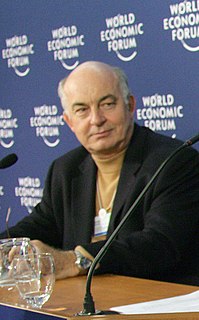A Quote by Franklin Foer
After the global financial crisis of 2008, populist uprisings had sprouted across Europe. Putin and his strategists sensed the beginnings of a larger uprising that could upend the Continent and make life uncomfortable for his geostrategic competitors.
Related Quotes
In 2012, the far-right Golden Dawn won 21 seats in Greece's parliamentary election, the right-wing Jobbik gained ground in my native Hungary, and the National Front's Marine Le Pen received strong backing in France's presidential election. Growing support for similar forces across Europe points to an inescapable conclusion: the continent's prolonged financial crisis is creating a crisis of values that is now threatening the European Union itself.
It is no exaggeration to say that since the 1980s, much of the global financial sector has become criminalised, creating an industry culture that tolerates or even encourages systematic fraud. The behaviour that caused the mortgage bubble and financial crisis of 2008 was a natural outcome and continuation of this pattern, rather than some kind of economic accident.





































